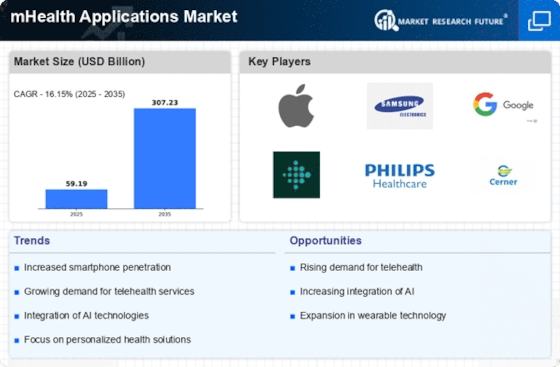Growing Focus on Mental Health
The mHealth Applications Market is witnessing a growing emphasis on mental health solutions. As awareness of mental health issues increases, there is a corresponding demand for applications that provide support and resources for mental well-being. Recent studies indicate that nearly one in five adults experience mental illness, highlighting the urgent need for accessible mental health care. mHealth applications offer features such as guided meditation, mood tracking, and virtual therapy sessions, which can be instrumental in addressing these challenges. This focus on mental health is likely to propel the mHealth Applications Market forward, as both consumers and healthcare providers recognize the importance of mental wellness in overall health.
Increased Smartphone Penetration
The mHealth Applications Market is significantly influenced by the widespread adoption of smartphones. With over 80% of the population in developed regions owning a smartphone, the accessibility of mobile health applications has surged. This trend is particularly pronounced among younger demographics, who are more inclined to utilize technology for health management. The convenience of having health information at one's fingertips fosters a culture of proactive health monitoring. Furthermore, the integration of advanced features such as GPS tracking and health sensors in smartphones enhances the functionality of mHealth applications. As smartphone penetration continues to rise, it is anticipated that the mHealth Applications Market will expand, catering to a growing user base that seeks personalized health solutions.
Integration of Artificial Intelligence
The mHealth Applications Market is increasingly incorporating artificial intelligence (AI) to enhance user experience and health outcomes. AI technologies enable applications to provide personalized recommendations, predictive analytics, and advanced data analysis, which can significantly improve the effectiveness of health management. For instance, AI-driven applications can analyze user data to identify patterns and suggest tailored interventions, thereby promoting better health behaviors. The integration of AI is not only appealing to consumers but also to healthcare providers who seek to leverage technology for improved patient care. As AI continues to evolve, its application within the mHealth Applications Market is likely to expand, offering innovative solutions that address complex health challenges.
Rising Demand for Chronic Disease Management
The mHealth Applications Market is experiencing a notable increase in demand for applications that assist in chronic disease management. As the prevalence of chronic conditions such as diabetes, hypertension, and cardiovascular diseases continues to rise, patients are seeking innovative solutions to monitor their health. According to recent data, approximately 60% of adults have at least one chronic condition, which underscores the necessity for effective management tools. mHealth applications provide functionalities such as medication reminders, symptom tracking, and real-time health monitoring, which empower patients to take control of their health. This trend is likely to drive the growth of the mHealth Applications Market, as healthcare providers increasingly recommend these tools to enhance patient engagement and improve health outcomes.
Regulatory Support for Digital Health Solutions
The mHealth Applications Market is benefiting from increasing regulatory support for digital health solutions. Governments and health organizations are recognizing the potential of mHealth applications to improve healthcare delivery and patient outcomes. Initiatives aimed at promoting telehealth and digital health technologies are being implemented, which may include funding for development and incentives for healthcare providers to adopt these solutions. This regulatory environment fosters innovation and encourages the development of new mHealth applications that meet the evolving needs of patients. As regulatory frameworks become more supportive, the mHealth Applications Market is expected to experience accelerated growth, driven by the introduction of new and improved applications.


















Leave a Comment